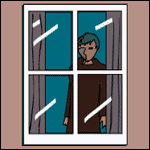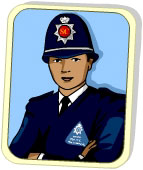The Key To Good Detective Stories
Created | Updated Nov 20, 2005
“Who dunnit” have long been popular, both in novel and television drama form. There are many to choose from, including Morse, Miss Marple, Poirot, Dalziel and Pascoe, and the recent CSI, among many others.

While every effort is made to keep up the suspense and sustain the mystery, there are certain clues and give-aways that tell you who is next in line to be murdered, how they will die or who did it.
So here we go……
When the detective or their family show up
Whenever Jessica Fletcher, Hercule Poirot or Miss Marple decide to go on holiday or to visit friends and family, people seem to drop dead. Coincidence? Maybe, but it makes life that bit scarier and a bit more interesting if you are one of these detectives surrounded by murder, even when you go on holiday. Though your assistance always proves extremely valuable to the local police who seem to miss some pretty darn obvious and vital clues. Don’t these guys ever get time off?!
Also, when the detective’s wife or children join your village fete committee, drama group or whatever, people will get murdered. This is especially noted in Midsomer Murders, where it seems everything Joyce and Cully Barnaby get involved in, whether it is the village fete, the drama group or the historical society, either involves the victims, or the murderer themselves. This also usually provides them with something vital to pass on to Barnaby and help him solve the crimes.
Number of victims
The number of victims can vary greatly between detective series and between episodes. It is usual for Agatha Christie’s Miss Marple and Poirot to have only one murder, two at most, while Colin Dexter’s Inspector Morse and Reginald Hill’s Dalziel and Pascoe usually involve a much higher body count. But the more bodies the better.
The victim's comments
There is a curious thing to note in those moments in which we follow the murderer as they kill their next victim. The camera follows the murderer to their chosen victim, who will turn around and say something like “Oh, it’s you!” or “What are you doing here?” The victim will never say “Hello, John” before getting murdered. It is clear that this device is employed to sustain the story and keep the viewer guessing as to the identity of the criminal. However, in real life is this what would really happen? I doubt it.

Also, if the victim is chased before they are murdered, they will invariably run into a forest, a barn or other similar such dark deserted place. They will not go to a nearby house or jump into their car and drive off. People in these stories mustn’t read or watch such stories themselves. If they did, they wouldn’t die.
The murder weapon
When it’s mentioned that a certain character owns a gun, someone will get shot. Though that gun will have been the murder weapon, the owner will not have pulled the trigger. They are also likely to take a couple of days to notice it’s gone. And upon discovering the gun’s disappearance, they are unlikely to tell the police for fear of incriminating themselves. This will, of course, result in them being incriminated. Well, duh!!

Similarly, if there is a vet or doctor in the story, a lethal dose will be used as the instrument of death. The drug will normally be seemingly harmless, but used in a large dose, or a sedative normally used on horses. The murders will also follow a small break-and-enter into the surgery.
Threats
This is a good indication as to who is about to be murdered.
When someone is threatened in public – like in the village pub or corner shop – they will soon be dead. However, the person who threatened will not have been the murderer. That’s just far too obvious, but gives the detective someone to blame and to hold for questioning until someone else gets killed. Woops!
Detection
If the detective team are working on some seemingly insignificant case before the murders take place, such as a burglary or car crime or something, this will be connected to the murders. For example, a break in at a pharmaceutical company will be connected to murders carried out using experimental drugs or the murders of key researchers.

An innocent comment, as passed by the sergeant, the wife, an estate agent, or another sideline character, will often provide the detective with a vital clue that will ultimately unlock the case.
Finally – never underestimate the little grey cells.
Some popular detectives and links
? Inspector Morse
? Inspector Lynley Mysteries
? Poirot
? Miss Marple
? Foyle’s War
? A Touch Of Frost
? Dalziel and Pascoe
? Midsomer Murders
? Murder, She Wrote
? CSI
? Sherlock Holmes
? Columbo
? Wycliff
? Kojak
? The Rockford Files
? The Ruth Rendell Mysteries
? Perry Mason
? Bergerac ?

Arthur Conan Doyle wrote Sherlock Holmes.
Can you solve The Obvious Crime?
